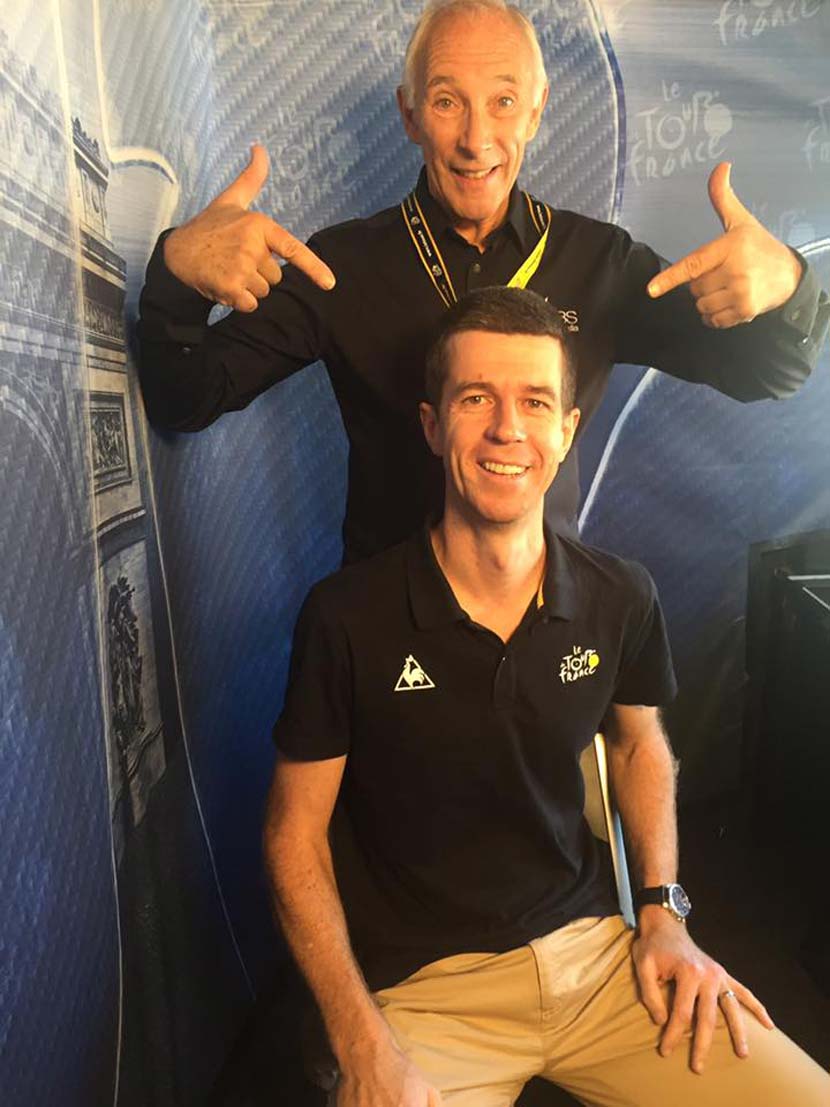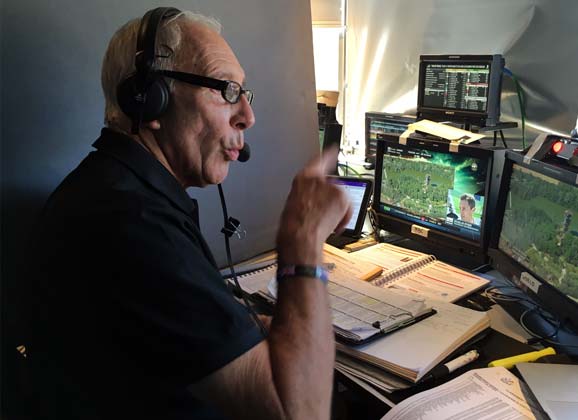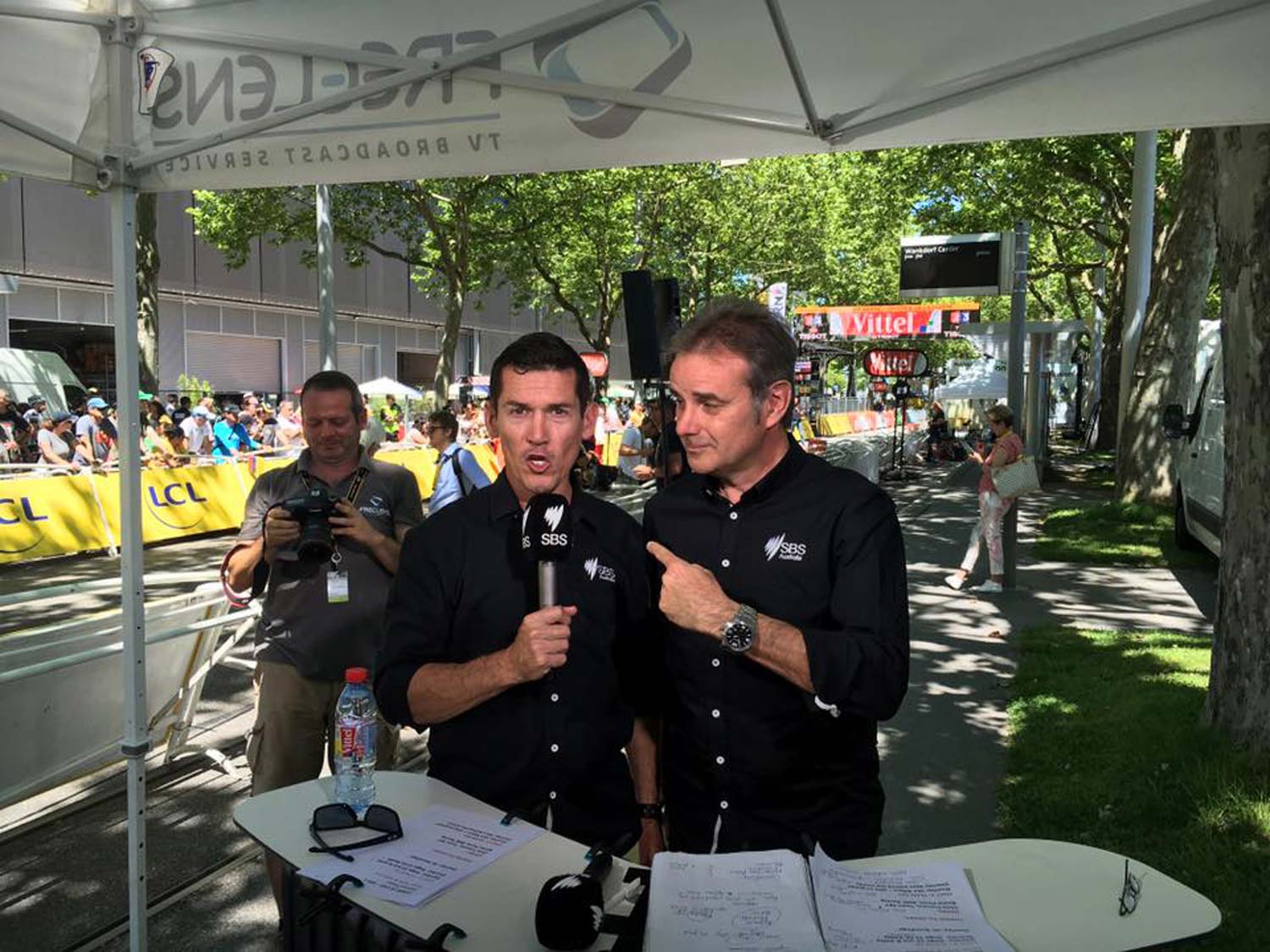[et_pb_section bb_built=”1″ admin_label=”section”][et_pb_row admin_label=”row”][et_pb_column type=”1_4″][et_pb_text admin_label=”Text” background_layout=”light” text_orientation=”left” use_border_color=”off” border_color=”#ffffff” border_style=”solid”]
One thing is apparent when following #SBStdf: most of the commentary is about the commentary. With that in mind, we are compiling a series of interviews with people behind the microphone to consider the topic of who we like to listen to and why…
– By Rob Arnold
[/et_pb_text][/et_pb_column][et_pb_column type=”3_4″][et_pb_text admin_label=”Text” background_layout=”light” text_orientation=”left” use_border_color=”off” border_color=”#ffffff” border_style=”solid”]
Cycling isn’t like other sports in many regards. Coverage of races, for example, is difficult to manage and there are many kinds of audiences, from the true aficionado to the newbie and all else in between.
Often the commentary team is two people: a ‘reporter’ and a former rider is the usual formula. Sometimes it’s just one person chatting by themselves for hour after hour. And although the action appears on TV screens, there’s a certain need to explain the images, identify the riders, offer some insight and, if possible, build the excitement.
It’s all about keeping the audience engaged and, ideally, educating them along the way.
* * * * *

* * * * *
More on the commentary of commentary
- Part 01: introduction
- Part 02: Rob Hayles interview
- Part 03: Ned Boulting Interview
- Part 04: David Millar interview
* * * * *
In a recent Facebook post, we published a photo of the man who is universally acknowledged as ‘The Voice of Cycling’, Phil Liggett. The caption to the image stated:
Putting together a big feature: commentary on commentary…
And this man is a key figure.
Quick poll: who do you most like to listen to when watching cycling?
The reaction was swift and significant.
The consensus of opinion seems to be: we respect and appreciate all that Phil Liggett and Paul Sherwen have done during the course of their careers but… well, perhaps it might be time for someone else to take over the mantle.
That is, of course, an attempt to paraphrase numerous comments and it’s done with a fair bit of tact – especially compared with some comments which were downright blunt. Some are even nasty… but this is something we’d rather avoid in this series as there’s nothing useful about taunts or abuse and, after all, it is just about how someone talks about a sport.
There are bigger things in the world to worry about but this is a divisive topic and it’s bound to generate a reaction from those who are passionate viewers of bike races. Still, as we progress through this series, let’s remember to keep the discussion civil and constructive.
* * * * *
“Phil [and] Paul are awful,” writes Josh Duggan. “They just string together ridiculous buzzwords like ‘chest of courage’ and ‘inspire’ and repeat it to death. I feel like the only bike race they watch all year is the Tour, they just provide no additional info than rather what is happening on the screen; and even get that wrong most of the time…”
This may seem like a strong opinion, but it is one of the more polite ones referencing P&P. Take a quick glance down the #SBStdf Twitter feed and you’ll see a sea of expletives as people express similar sentiment, albeit often at a rather late time of day and with a degree of delirium setting in…
Still, Duggan isn’t alone in his appraisal.
Furthermore, many are quick to reference the (growing) contributions from Matthew Keenan and Robbie McEwen who have been charged greater responsibility by SBS in 2016 than ever before.
The commentator/rider formula remains but you could be forgiven for thinking that McEwen was born to be a television presenter. He looks great on camera and has complete confidence in doing his job, there’s an intimate understanding of the topic and he has a vocabulary and knowledge of languages that helps the viewer understand what’s really going on in a race.
McEwen can identify riders by their style even if it’s a shot from a helicopter 150 metres above the peloton and then offer numerous anecdotes about how and why they are worthy of referencing.
Meanwhile, Keenan’s knowledge of cycling’s history and his penchant for fun facts and race trivia compliments much of what McEwen has to say.
The Australian pair has called entire Grand Tours together, the Giro d’Italia in May the most recent example. They have ‘done’ the Classics season and also worked together in many other scenarios since McEwen stopped racing a few years ago.
“Robbie and Matt are the ‘new team voice of cycling’,” states Paul Andersch in his reaction to the FP poll. “[I] love listening to [those] guys – it’s awesome and refreshing with [their] cycling knowledge and history comments along the route of every stage with [a] great sense of humour.”
* * * * *
Some viewers still love P&P and even suggest they wouldn’t tune in if their voices weren’t part of the broadcast. Others insist that they can only watch with the volume turned down when the veterans are speaking.
It’s interesting to note that, after many years of calling the Tour de France for the ITV broadcast in the UK, P&P are no longer doing the job. Instead, in 2016, there is another commentator/rider pairing at the microphones: Ned Bolting and David Millar.
Initially the reaction was shock mixed with vitriol: “How can it be that Liggett and Sherwen aren’t spending July with me!?’ That sort of thing. But it only took a few days and the uproar abated and people settled back into the lounge, their beverage of choice by their side, and they listened to the new pairing.
It seems that many Australians believe a similar revolution should take place: out with the ‘old’, in with the ‘new’.
Alas, rarely is such feedback offered in a simple manner: ‘We like/dislike Phil and Paul, may we please have… [insert commentator preference] instead?’
Often comments are in ALL-CAPS and there is GENUINE FURY about… well, it could be about anything really: the incorrect pronunciation of a name, the repetition of a cliché, references to animals seen as the peloton works its way around France… there are many reasons for the high level of disdain for the words spoken during the broadcast of a bike race.
All that being said, let’s consider a few obvious facts:
- There’s more cycling coverage in Australia than ever before.
- No one deliberately does a bad job.
- Talking for hours on end about any topic, without reprieve – and with plenty of distractions – is never easy.
- No one knows everything about everything… nor should one assume that, even if someone did, that ‘everything’ would fit into a window of time that spans from départ fictif to flamme rouge.
- People, of course, have a wide range of tastes and no one formula exists that will satisfy everyone.
(There are many more points, but we’ll keep it at five for the time being…)
* * * * *
In the coming days we’ll present a series of interviews about the commentary of commentary. We welcome feedback (via Facebook, Twitter or email) but ask one thing: please be respectful and courteous when expressing opinion.
Commentators are people too and even if you don’t agree with how they call a bike race, it’s never appropriate to use vitriol in a public forum that can be upsetting. Get emotional by all means but also please at least consider the emotions of others.
Many people have spent many hours in front of the television or with the radio on while a race like the Tour de France is unfolding and this leads to an emotional attachment to the coverage. We understand this and also appreciate that, in many instances, comments that can be perceived as mean are often written within the context of a ‘conversation’ amongst friends (in, for example, Twitter exchanges).
We consume our media in different ways than we did not too long ago. There are many options for how you see your cycling but try to remember the thing that drew you to the sport in the first place: it’s a beautiful thing to watch. And if you like the commentary, that’s great. If you don’t like the commentary, there’s always the mute button.
– By Rob Arnold
[/et_pb_text][/et_pb_column][/et_pb_row][/et_pb_section]




